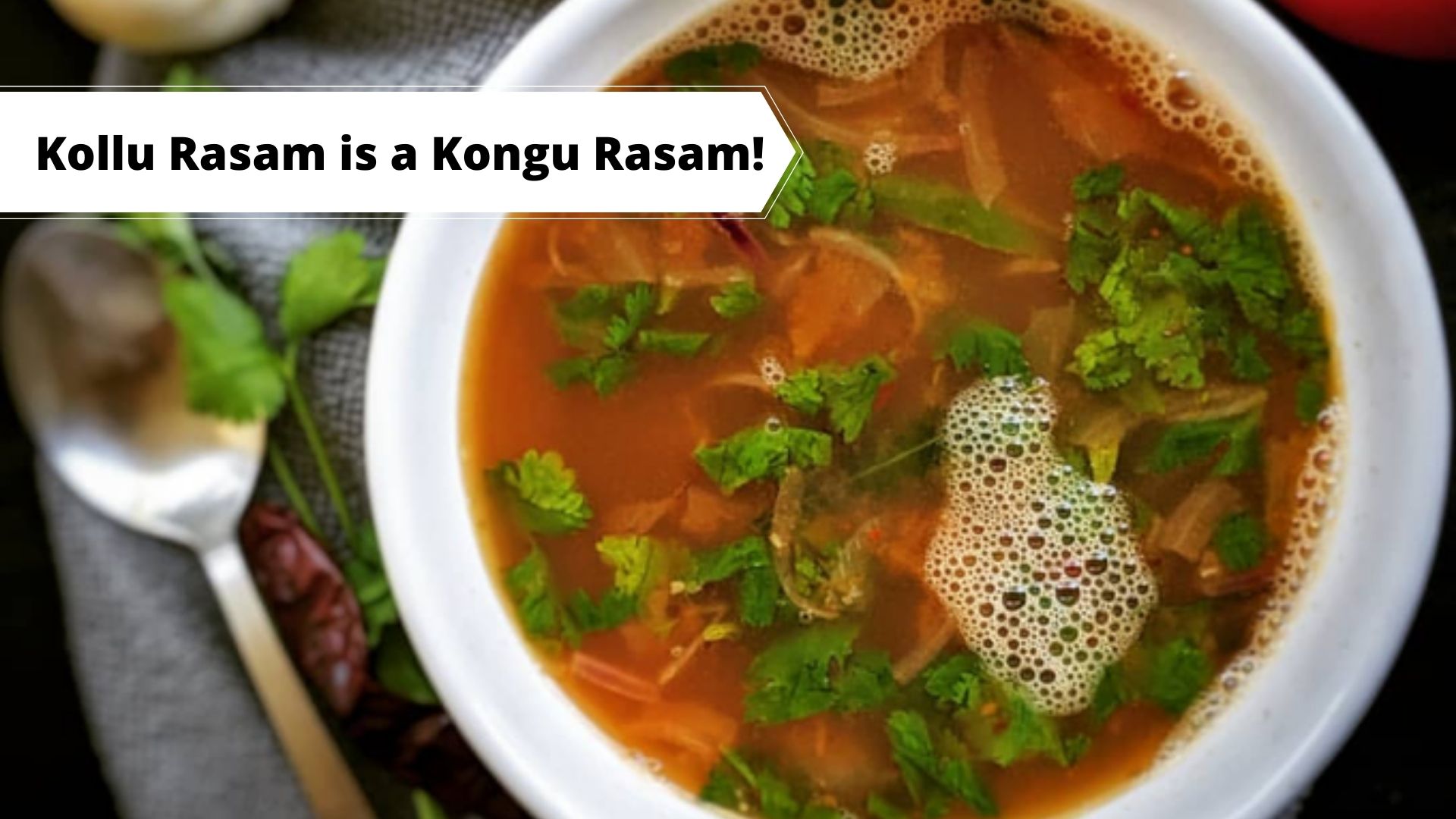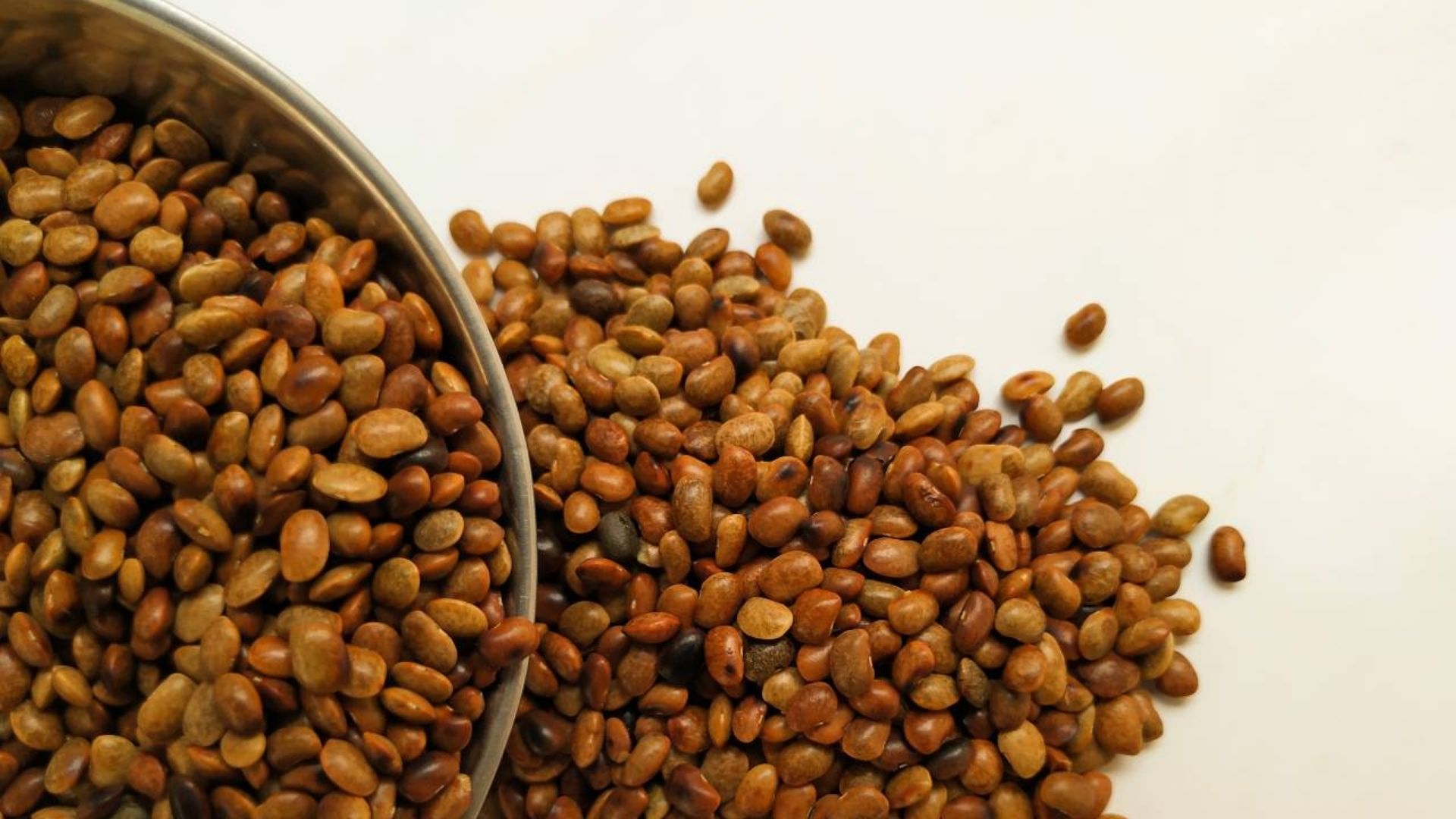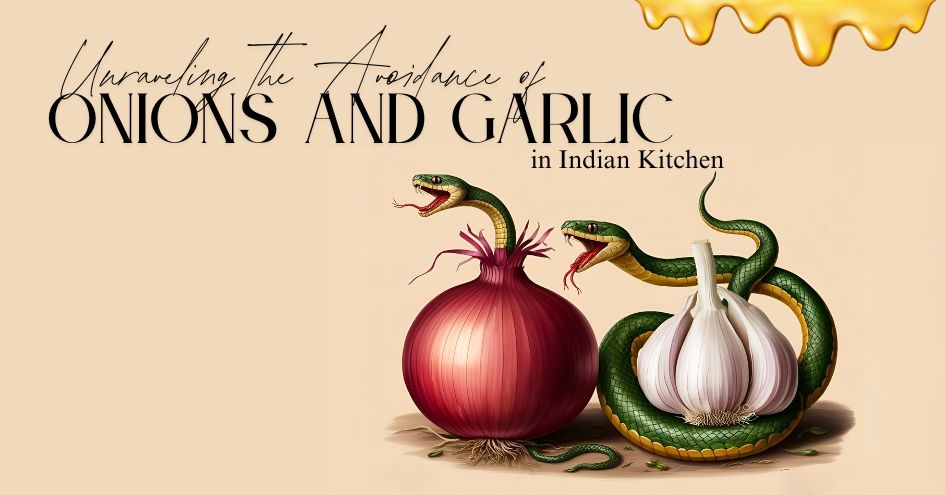So as you all know this is "Summer season" in this time everyone would try some ice "kalt " drinks .I gladly got a chance to write a article this week,When I got "Kalt".So "Kalt" refers to cold in german.Yeah I got cold and I got chance to write on traditional foods of "Kongu region" and this cold induce me to select Macrotyloma uniflorum.Yeah it is nothing but horse gram or fondly called கொள்ளு - 'kollu' in northern districts and காணம் - 'kaanam' in southern districts.Especially we will see the kongu region special kollu rasam recipe !

Historical significance:
The soup extract from kulattha or kollu (Horse gram), called yusa, was consumed commonly during the Sutra period (1500–800 BC) are the rasams of today. Uniflorum or kollu is a short day and day neutral plant, matures in 120–180 days after planting . The origin of the horse gram is not known. However, the region of maximum genetic diversity is considered to be in the Old World Tropics, especially in India and Himalayas . It has been used as a food item for millennia. Archaeological investigations revealed that horse gram was used as food around 2000 BC . It was first domesticated in India.
Geographical significance:
Geographic location of Coimbatore played a major role in this. Horse gram grows well in moderately warm, dry climatic conditions.It does not grow well at higher altitudes because of the cool and wet climate. Horsegram can be cultivated up to an altitude of 1000 m above the sea level. The temperature range of 25 - 30°C and relative humidity between 50 and 80% the above mentioned climatic conditions will match exactly to climatic conditions of Coimbatore too.Basically coimbatore is located in the rain shadow region (Rain shadow region refers to a place which is located behind the mountain,So the place usually receives less rainfall comparatively to the other side of the mountain,Here in this case Coimbatore or Kongu region is a rain shadow region due to the presence of “Western Ghats". Similarly there are many regions in India and Tamilnadu.
Health benefits of Horse gram:
• Horse gram is an excellent source of protein (22-24%). Seeds contain carbohydrates (57.2%), fat (1.1%), vitamins, minerals (3.2%) and good amount of soluble fibers
• Scientists have claimed that the grain legumes effectively contribute to a balanced diet and can prevent widely diffused diseases, including type II diabetes and cardiovascular diseases (Leterme 2002).
• The extracts from M. uniflorum seeds had significant activity against Bacillus subtilis, Staphylococcus aureus, Escherichia coli, and Pseudomonas aeruginosa (Gupta et al. 2005).
• Different parts of the horse gram plants are used for the treatment of heart conditions, asthma, bronchitis, leucoderma, urinary discharges and for treatment of kidney stones
• In rural areas, seeds of horsegram are consumed after parched followed by boiling or frying along with cooked rice, sorghum or pearl millet. Sprouted seeds, having high nutritional quality, are widely consumed by the indigenous tribal peoples .
• Even now, in addition to its nutritive value, the consumption of sprouted seed has become increasingly popular due to the excellent source to reduce the risk of various diseases and exerting health promoting effects .
• In Indian traditional medicine, seeds of horse gram are used for treatment of urinary stones urinary diseases and piles.
• Regulating the abnormal menstrual cycle in women act as astringent, tonic and also used to treat calculus afflictions, corpulence, hiccups, and worms .
• Furthermore, the cooked liquor of the horse gram seeds with spices is considered to be a potential remedy for the common cold, throat infection, fever and the soup said to generate heat
• Especially talking about kollu rasam it is well known for its characteristics for controlling cold and fever.Kollu Rasam is a wholesome recipe of Rasam made from Kollu.This dish is a specialty of the Kongunadu region of Tamil Nadu. It is rich in taste and at the same time rich in protein and iron apart and has high antioxidant capacities along with hemagglutinin which is a substance found in antibodies and autoimmune functions.

Ingredients for Kollu Rasam:
Water leftover from cooked Horse Gram
Tamarind Pulp - 1/2-1 lime size differs
Ingredients for Paste:
Sesame Oil - 1 tbsp
Black Pepper - 2 tsp
Cumin Seeds - 1 tsp
Garlic - 3 to 4 cloves
Tomato – 1 medium
Salt - 1 tsp
Horsegram - 1/4 cup, cooked
Mustard Seeds - 1/2 tsp
Fenugreek Seeds - 1/4 tsp
Cumin Seeds - 1/4 tsp
Curry Leaves - 1 spring
Ghee 1 -2 tsp
Asafoetida - a pinch
Ingredients for Finishing:
Jaggery - 1 tsp or preferential sugar (optional)
Coriander Leaves - 1 tbsp
Method:
1. Boil 1/4 cup of horsegram with 2 cups of water in a pressure cooker for 10 minutes. Drain the water and set aside.
2. Soak half or full lime size tamarind in water for 15 minutes and make a puree out of it and set aside.
3. Heat sesame oil in a pan and add pepper, cumin and garlic and saute till it starts to pop.
4. Add in one medium chopped tomato and salt. Cook the tomatoes till they start to become semi dry.
5. Add in 3 to 4 tbsp of cooked horse gram and remove off heat.
6. Let this mixture cool and then grind to a smooth paste.
7. Heat ghee in a pan and add a pinch of asafoetida followed with mustard seeds, urad dal, fenugreek seeds and cumin seeds. Let it pop.
8. Add in the tamarind juice, the ground paste and the curry leaves. Let it simmer on low flame for 10 minutes.
9. Add in the horsegram leftover lentil water. Cook for a couple of minutes more.
10. Add in a small piece of jaggery or 2 tsp of sugar. Remove off heat.
11. Garnish with finely chopped coriander leaves and serve piping hot with rice.
Yummy ! Kollu rasam is ready to be serve
There are several dishes like this which are oriented with our Coimbatore or Kongu region,Which we are traditionally having in our food chain but nowadays due to our modern lifestyle we are losing it from our food chain, which has an adverse affect on our health. Hope we have our household kollu again in our houses

Sreenivasan is also called as Plankton. He is a student from PSG college of Arts and Science and pursuing his Undergraduation in Biochemistry. He is an avid Coimbatorian and an aspiring researcher of bio-infomatics.
NEXT ARTICLE

Can onions and garlic be consumed? For many adherents of Hinduism, Jainism, and other spiritual paths originating from the Indian subcontinent, these...